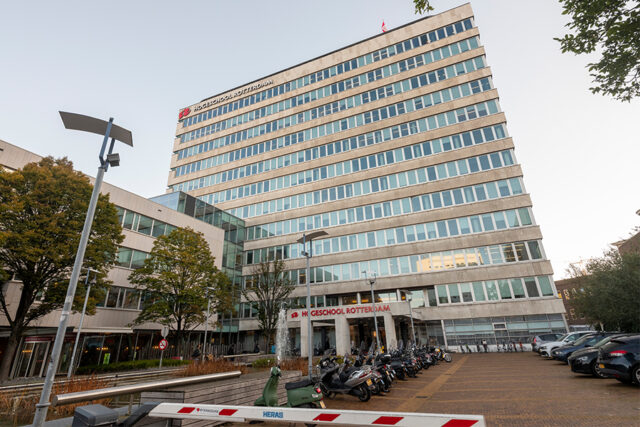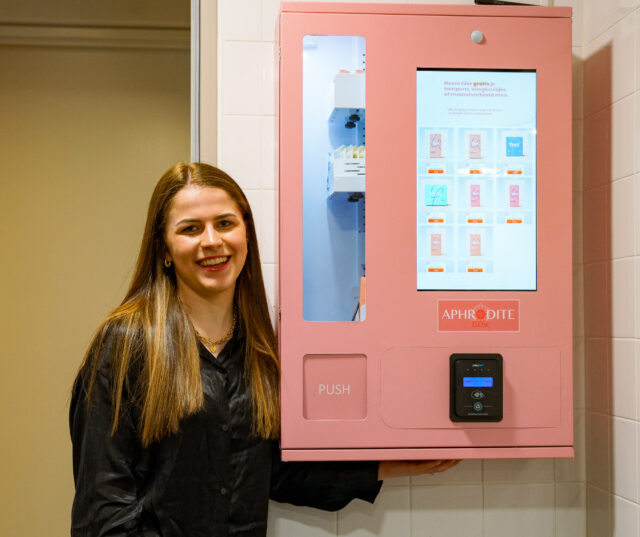Working together at the Kralingse Zoom, is that possible?
Gepubliceerd: 2 November 2017 • Leestijd: 4 minuten en 40 seconden • English Dit artikel is meer dan een jaar oud.You can decide that it’s important to work together, but does that mean it will actually happen? The preliminary conclusion seems to be: yes. Education Managers and others are looking for collaboration opportunities for CoM (the Institute for Commercial Management), IFM (the Institute for Financial Management), RBS (the Rotterdam Business School) and IBK (the Institute for Business Administration). Objective: One economic domain, one Rotterdam University of Applied Sciences Business School.
 ‘Meet & Greet the Future of Finance’ is an event for graduating students and companies, organised for the second time by the Institute for Financial Management in mid-October. However, there is at least one difference compared to last year: fellow institute CoM is also participating and ‘& Commerce’ has been added to the name of the event. A year ago, this collaboration would not have been so obvious, CoM was temporarily located in the WTC, about 5 kilometres away.
‘Meet & Greet the Future of Finance’ is an event for graduating students and companies, organised for the second time by the Institute for Financial Management in mid-October. However, there is at least one difference compared to last year: fellow institute CoM is also participating and ‘& Commerce’ has been added to the name of the event. A year ago, this collaboration would not have been so obvious, CoM was temporarily located in the WTC, about 5 kilometres away.
Today, the two institutes are part of the Business School of the Rotterdam University of Applied Sciences (HR) which expects its four institutes to work together. And so that is happening, or at least a start is made.
Sharing the same office with colleagues from other institutes
Lindsey Kartodimedjo, staff member external relations for the IFM, explains that even the simple fact that she now shares the office with colleagues from the three other institutes makes a difference. ‘Together with an immediate colleague, I suggested to the other institutes that they could join the Future of Finance event and CoM decided to do so. In our day-to-day work, we’re more in touch anyway. You ask each other, for example: ‘Say, how do you do that?’.’
Sharing one office also has a positive effect on scheduling, says Martijn de Ruiter, HRM Education Manager for the Institute for Business Administration. ‘If we need an extra classroom at a given moment, we just walk over to the timetabler who can then ask his colleagues right away whether someone has a room available somewhere.’
Consultations between COM, IFM, RBS and IBK were a regular occurrence already in the past two years
This collaboration did not spring up overnight. Directors and Education Managers of the COM, IFM, RBS and IBK institutes have already been consulting with each other about the HR Business School for the past two years.
‘So that was happening already when we were not yet all housed in the same building and when didn’t know each other that well,’ says De Ruiter. ‘Now we are in the same building and we know the other Education Managers.’ Among other things, this has ensured that a good HRM teacher was able to stay on at the University. ‘Since we are an intake-restricted education and he had a temporary contract, we were forced to part with him. After consulting with the Education Manager of another institute, he can now stay on at the HR Business School. If we would not know each other, that would never have happened.’
Exchanging teachers between various departments was not unusual at the Institute for Business, but now it goes beyond the institute. De Ruiter: ‘One of our teachers, who has a minor, is now in contact with someone who has a minor in International Business and Management Studies; they are now discussing what they could offer by bringing together their expertise.’ The department of Trade Management specialising in Asia (TMA, which is part of the Rotterdam Business School) and the department of Entrepreneurship (CoM) have already taken it a bit further, reports Berry Andeweg, Education Manager of the latter department. ‘We will be developing a joint minor this year.’
At the department of International Business and Languages (IBL, one of the other Rotterdam Business School programmes), they’re looking beyond their own institute as well, says Education Manager Andrea Boogaard. ‘I’m discussing this with Global, one of the communities of Commercial Economy (CoM). We are trying to find ways of working together, for example by exchanging teachers and offering a joint programme.’
‘It is an enriching experience for a teacher to spend some time working in another programme.’
‘In the past, teachers from Commercial Economy, for example, have been seconded to IBL,’ explains the Education Manager. ‘I think it is an enriching experience for a teacher to be able to voluntarily spend some time working in another programme. Moreover, it makes it easier to help each other out in dire situations. For example, if necessary, you can go to another institute and ask: ‘Do you have a Finance teacher available?’ Something like that is so much easier now that we’re all in one building. The only problem is that the schedules of the different institutes do not completely overlap.’
Boogaard finds it an important aspect of collaboration that the programmes inform students in such a way that they will be able to make the right choice between, for example, IBL and Global. Or that they switch programmes early enough if they’ve made the wrong choice. ‘Our programmes are similar, but we are more internationally oriented because of our international student population and the fact that we teach all courses in English. Global is mainly international from the point of view of the Netherlands. It is important that students who would prefer a Dutch-language programme are made aware of Global.’
Increasing willingness to learn from each other
Education Managers Andeweg and De Ruiter also emphasize the willingness, among teachers for example, to work together. De Ruiter: ‘Yes, that’s just so great to see: the increasing willingness to help each other and learn from each other.’
Wasn’t that possible when you were located at Museum Park? ‘We could certainly have learned from each other,’ says the Education Manager. ‘But there, with ISO (Social Work) and IvL (Teacher Training), things were more separate. You’re apparently drawn more towards your own kind, the economic aspect you share.’
Still, not everyone at the Kralingse Zoom is working together yet, according to Maartje Fokkema, teacher at the Institute for Financial Management, the institute that perhaps has the least contact with the other three institutes. Fokkema: ‘To be honest, we still see little evidence of any collaboration. The IMR’s (the institutes’ participation councils; Fokkema is a member of the IFM council, red.) did address issues related to the new building together, such as car, bicycle and scooter parking, and smoking.’
The focus is on cutbacks, not collaboration
However, the Institute for Financial Management is mainly concerned with matters other than collaboration, says Fokkema. ‘There is a serious lack of money, making everyone work as hard as they can. The focus of the Executive Board is mainly on cutbacks and securing more funds, particularly by having long-term students graduate.’
The result of this is that all kinds of extras are being abolished. Fokkema: ‘Team outings, chocolate letters, the traditional summer barbecue: there is no money for any of it. To free teaching hours even the professionalisation has been put on hold. You will understand that under these circumstances, teachers have little eye for opportunities to collaborate with colleagues from other institutes. The other institutes may be able to help us, but that is something that should be initiated by the Institute Directors.’
Story: Jos van Nierop
Illustration: Bart Zwart






Collaboration is an important strategy to compete strongly against other educational institutions around the world. I always say “two brains are better than one” what more if 100 brains working together for a common cause? Probably, in short term,
collaboration can create a dip within and between institutions. This is normal. But with positive attitude, honesty and transparency with and for another, we can overcome this dip and be able to achieve the long term success both for the institutions and the students.
With collaboration, I believe we will function not only as one strong educational body but will operate financially efficient.